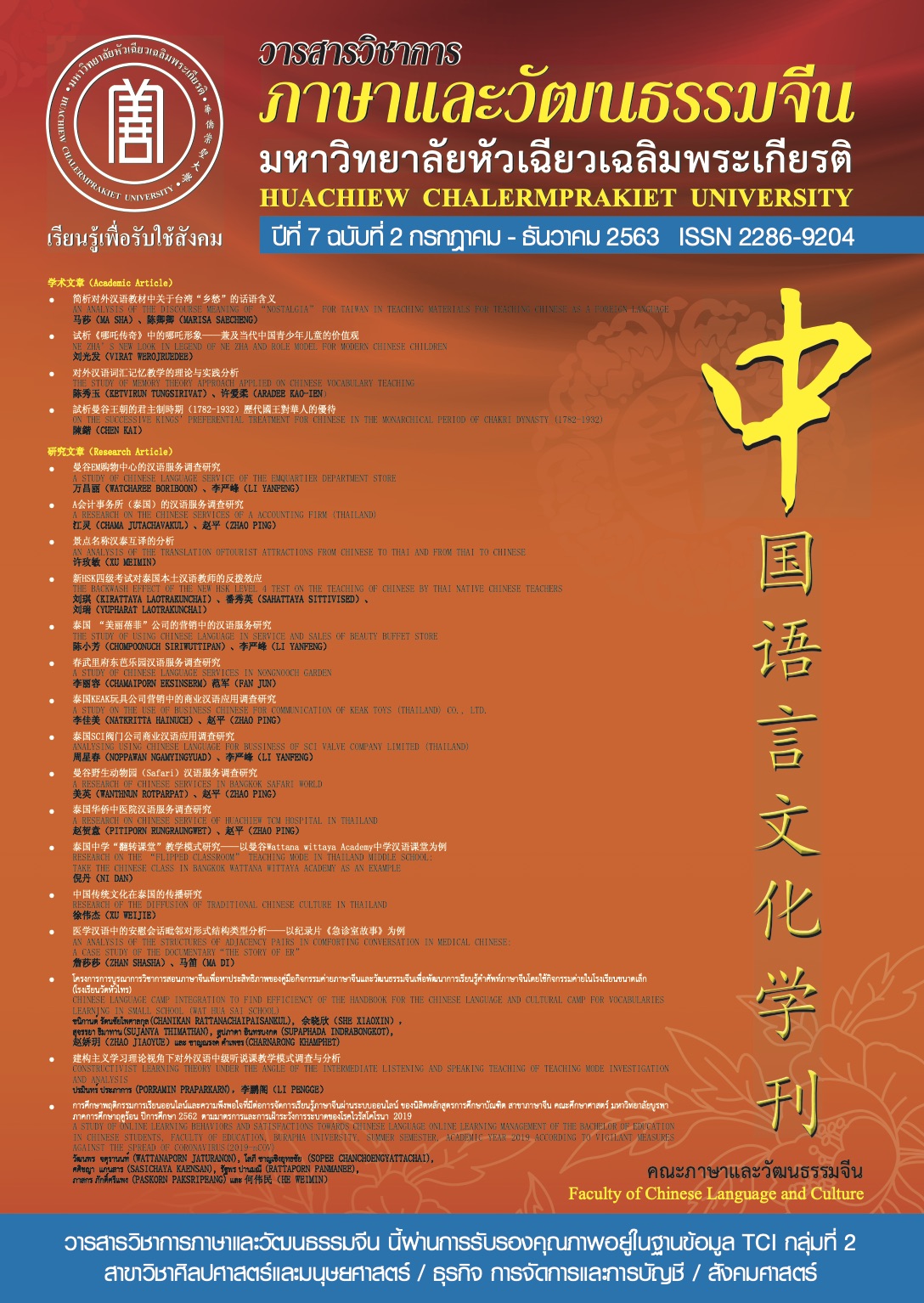THE STUDY OF MEMORY THEORY APPROACH APPLIED ON CHINESE VOCABULARY TEACHING
Keywords:
Vocabulary memory, Vocabulary teaching, Classroom observationAbstract
Vocabulary is an important part for foreign students studying Chinese. Since a number of vocabularies are abundant. The teacher not only has to encourage students to develop their Chinese skills, including the understanding of Chinese characters, Chinese pronunciations and Chinese direct and cultural meanings, but also needs to find proper methods to help students to memorize Chinese vocabularies. Thus, Memory strategy is very important. While teaching Chinese vocabularies, the teacher has to attach the importance to the Chinese vocabulary teaching memory strategy. In this paper, the author will use vocabulary memory strategy based on cognitive theory to observe the Chinese vocabulary classes in China (Chinese lesson for foreign students in Beijing language and Culture University) and Thai (high school in Nakhon Pathom and Ratchaburi province, Faculty of Education in Silpakorn University), show the similarities and differences of vocabulary classes between two countries. From the study, we learn that Chinese vocabulary class teacher should be more aware of 3 points: 1) students’ prior knowledges 2) vocabulary encoding 3) preview and review the lesson. In the end of the paper, the author provides an example of the curriculum, by dividing the curriculum into 3 stages: before class, in class and after class in order to improve students’ vocabularies memory skills.
References
Miller, G. A. (1956). “The magical number seven, plus or minus two: some limits on our capacity for processing information”Psychological Review. 63(2) page 81–97.
Panjaluck Thawai (2013). A Study of English Vocabulary Achievement and Retention of Prathomsuksa Five Students at the Elementary Demonstration School of Bansomdejchaopraya Rajabhat University by Using Reading Plus Vocabulary Enhancement Activities. SDU Research Journal.10(2) page55-72.
王文宇.观念、策略与英语词汇记忆.[J].外语教学与研究,1998、(01):49-54+80
戈尔茨坦.认知心理学心智、研究与你的生活.[M].北京:中国轻工业出版社,2015.
邬厚民.微课资源的建设与应用.[M].长春:东北师范大学出版社,2017.
毛贻锋.认知心理学理论在对外汉语词汇教学中的应用.[J].文学界,2011、(03):88-89+91
王骏.汉语词汇在长时记忆中的贮存模式及其对教学的意义.[J].语言教学与研究,2008(04):47-53
王笑艳.新时期对外汉语教学法专题研究.[M].北京:九州出版社,2017.
成云.教育心理学.[M].成都:西南交通大学出版社,2015.
刘娟娟,李桂琼.基于“过度学习原理”的留学生汉语词汇记忆探析.[J].红河学院学报,2016,14(03):116-118
朱敏.对外汉语教学中的词义理解和词汇记忆问题.[J].南京师大学报(社会科学版),1991,(04):89-92
刘琛.从认知心理学的角度看对外汉语词汇教学:[硕士学位论文].[D].上海:华东师范大学,2004
李汉松.心理学小史.[M].北京:中国法制出版社,2018.
吴世雄.认知心理学关于记忆的研究对汉语词汇教学的启迪.[J].语文学刊,1999、(04):42-45
张和生.外国学生汉语词汇学习状况计量研究.[J].世界汉语教学,2006、(01):70-76+3
张晓苏.认知心理视角下的对外汉语词汇课堂教学研究:[博士学位论文].[D].上海:华中师范大学,2012
李晓琪. 博雅汉语初级起步篇一.[M].北京:北京大学出版社,2013.
陈琦,刘儒德.当代教育心理学.[M].北京:北京师范大学出版社,2007.
孟凯.“2010年视频:初级汉语综合课(上)第八届优秀教学奖一等奖获得者教学观摩课” [online],(http://58.194.240.26:8086/mrs/mrs/libInfo_in.jsp?libId=920),2020/01/01
赵明慧.结合记忆策略的对泰大学生汉语词汇教学设计:[硕士学位论文].[D].济南:山东大学,2012
黄彩玉,朱淑洁.图式理论在对外汉语词汇记忆教学中的理论与实践.[J].继续教育研究,2013,(8): 148-150
Downloads
Published
How to Cite
Issue
Section
License
บทความที่ได้รับการตีพิมพ์เป็นลิขสิทธิ์ของวารสารภาษาและวัฒนธรรมจีน มหาวิทยาลัยหัวเฉียวเฉลิมพระเกียรติ
บทความใน “วารสารวิชาการภาษาและวัฒนธรรมจีน” เป็นทรรศนะของผู้เขียนโดยเฉพาะ กองบรรณาธิการไม่มีส่วนในความคิดเห็นในข้อเขียนเหล่านั้น




